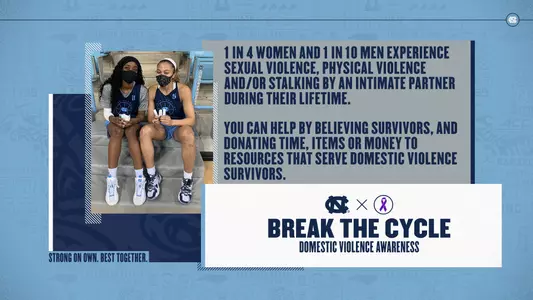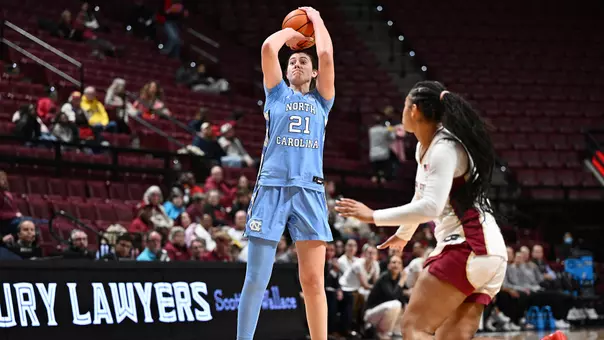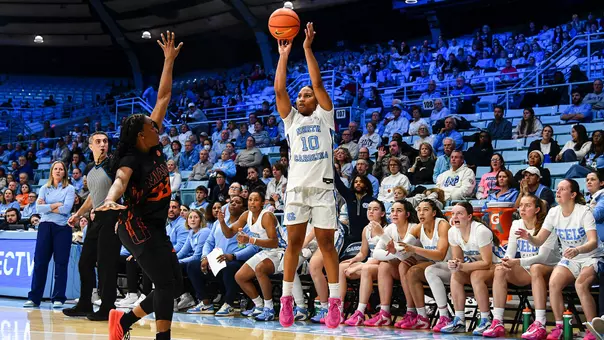University of North Carolina Athletics

Educate and Advocate: Domestic Violence Awareness
February 17, 2021 | Women's Basketball
Throughout the 2020-21 campaign, the UNC women's basketball team will highlight various causes, dedicating the season to advocating for and bringing awareness to issues that are near and dear to the Tar Heel student-athletes and coaching staff.
UNC takes on Clemson this Thursday and NC State this Sunday, and the team has dedicated the games to raising awareness of domestic violence.
The National Coalition on Domestic Violence (NCADV) defines domestic violence as the willful intimidation, physical assault, battery, sexual assault, and/or other abusive behavior as part of a systematic pattern of power and control perpetrated by one intimate partner against another. It includes physical violence, sexual violence, threats, economic, and emotional/psychological abuse. The frequency and severity of domestic violence varies dramatically. (ncadv.org)
Some facts about domestic violence:
• One in four women and one in nine men experience severe intimate partner physical violence, sexual violence and/or stalking which can lead to physical, mental and reproductive health issues. One in three women and one in four men have experienced some form of physical violence by an intimate partner. (ncadv.org)
• Many victims of domestic violence suffer in silence due to the stigma around domestic violence and the fear that they might be treated differently by family, friends, and coworkers. Victims and survivors may feel afraid they will not be believed or will be judged, afraid they will be retaliated against, and/or afraid they are somehow responsible for the abuse. It is never the victim's fault and no one deserves any type of abuse. Educating and continuing to raise community awareness of the dynamics of domestic abuse are keys to reducing these perceptions and ending the silent cycle of abuse that many victims face. (thehotline.org)
• Despite the stereotype that men are rarely the victims of domestic abuse, the truth is that victims can come from any socioeconomic background, education level, race, age, gender, religion, or sexual orientation. (nccadv.org)
• Forty-three percent of dating college women reported experiencing violent and abusive dating behaviors including physical, sexual, digital, verbal, or other controlling abuse. Nearly 1 in 3 college women say they have been in an abusive dating relationship. (loveisrespect.org )
Here are some types of Intimate Partner Violence, courtesy of UNC Hospital's Beacon Program:
• Physical: pushing, slapping, hitting, pulling hair, burning, biting, choking/strangulation, using a weapon or item to physically harm, breaking/smashing things, hurting children or pets.
• Emotional/Verbal: name-calling, put downs, causing a feeling of worthlessness, humiliation, insults in private or in public, isolation and threats, including threats of taking away children if abuse is reported.
• Psychological: invalidating reality, making someone feel he/she is going "crazy", using actions or words that destroy self-confidence, blaming, playing mind games.
• Financial: controlling how money is spent, refusing to give access to money or access to funds, creating debt (i.e., getting credit cards in a victim's name and maxing them out), not allowing a someone to have a job, taking a paycheck from someone who is working.
• Sexual: forcing unwanted sexual contact, drugging or intoxicating in order to have sexual contact, unwanted touching.
A domestic violence experience is common among those who become homeless and for many it is the immediate cause. (EndHomelessness.org)
All season, our team has collected toiletries and will donate them this week to IFC HomeStart, a shelter in Chapel Hill that serves families and single women.
You can help by believing survivors – no one deserves abuse, and abuse is never the victim's fault. You can also support by donating your time, funds or needed items to organizations that support victims of domestic violence.
The following organizations offer opportunities to make an impact.
• North Carolina Coalition Against Domestic Violence (nccadv.org)
• National Coalition Against Domestic Violence (ncadv.org)
• Compass Center for Women and Families, Chapel Hill (compassctr.org)
• HomeStart (ifcweb.org)
Together we can break the cycle of domestic violence.
UNC takes on Clemson this Thursday and NC State this Sunday, and the team has dedicated the games to raising awareness of domestic violence.
The National Coalition on Domestic Violence (NCADV) defines domestic violence as the willful intimidation, physical assault, battery, sexual assault, and/or other abusive behavior as part of a systematic pattern of power and control perpetrated by one intimate partner against another. It includes physical violence, sexual violence, threats, economic, and emotional/psychological abuse. The frequency and severity of domestic violence varies dramatically. (ncadv.org)
Some facts about domestic violence:
• One in four women and one in nine men experience severe intimate partner physical violence, sexual violence and/or stalking which can lead to physical, mental and reproductive health issues. One in three women and one in four men have experienced some form of physical violence by an intimate partner. (ncadv.org)
• Many victims of domestic violence suffer in silence due to the stigma around domestic violence and the fear that they might be treated differently by family, friends, and coworkers. Victims and survivors may feel afraid they will not be believed or will be judged, afraid they will be retaliated against, and/or afraid they are somehow responsible for the abuse. It is never the victim's fault and no one deserves any type of abuse. Educating and continuing to raise community awareness of the dynamics of domestic abuse are keys to reducing these perceptions and ending the silent cycle of abuse that many victims face. (thehotline.org)
• Despite the stereotype that men are rarely the victims of domestic abuse, the truth is that victims can come from any socioeconomic background, education level, race, age, gender, religion, or sexual orientation. (nccadv.org)
• Forty-three percent of dating college women reported experiencing violent and abusive dating behaviors including physical, sexual, digital, verbal, or other controlling abuse. Nearly 1 in 3 college women say they have been in an abusive dating relationship. (loveisrespect.org )
Here are some types of Intimate Partner Violence, courtesy of UNC Hospital's Beacon Program:
• Physical: pushing, slapping, hitting, pulling hair, burning, biting, choking/strangulation, using a weapon or item to physically harm, breaking/smashing things, hurting children or pets.
• Emotional/Verbal: name-calling, put downs, causing a feeling of worthlessness, humiliation, insults in private or in public, isolation and threats, including threats of taking away children if abuse is reported.
• Psychological: invalidating reality, making someone feel he/she is going "crazy", using actions or words that destroy self-confidence, blaming, playing mind games.
• Financial: controlling how money is spent, refusing to give access to money or access to funds, creating debt (i.e., getting credit cards in a victim's name and maxing them out), not allowing a someone to have a job, taking a paycheck from someone who is working.
• Sexual: forcing unwanted sexual contact, drugging or intoxicating in order to have sexual contact, unwanted touching.
A domestic violence experience is common among those who become homeless and for many it is the immediate cause. (EndHomelessness.org)
All season, our team has collected toiletries and will donate them this week to IFC HomeStart, a shelter in Chapel Hill that serves families and single women.
You can help by believing survivors – no one deserves abuse, and abuse is never the victim's fault. You can also support by donating your time, funds or needed items to organizations that support victims of domestic violence.
The following organizations offer opportunities to make an impact.
• North Carolina Coalition Against Domestic Violence (nccadv.org)
• National Coalition Against Domestic Violence (ncadv.org)
• Compass Center for Women and Families, Chapel Hill (compassctr.org)
• HomeStart (ifcweb.org)
Together we can break the cycle of domestic violence.
Carolina Insider: Rapid Reactions – Men’s Basketball vs. Notre Dame – January 21, 2026
Thursday, January 22
MBB: Hubert Davis Post-Notre Dame Press Conference
Thursday, January 22
UNC Men's Basketball: Three-Pointer Powers Heels Past Irish, 91-69
Thursday, January 22
Checking In with Hubert Davis - January 20, 2026
Tuesday, January 20














